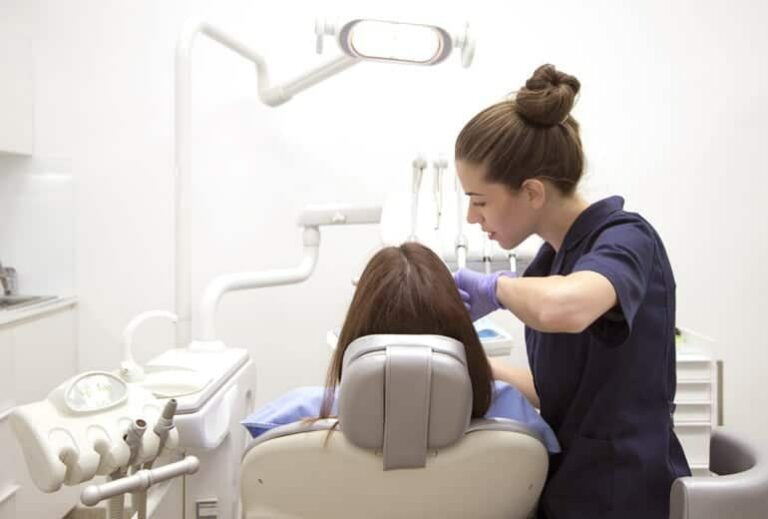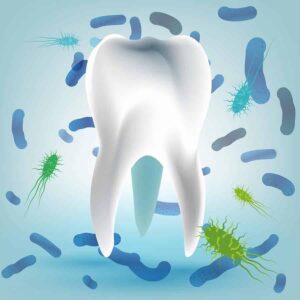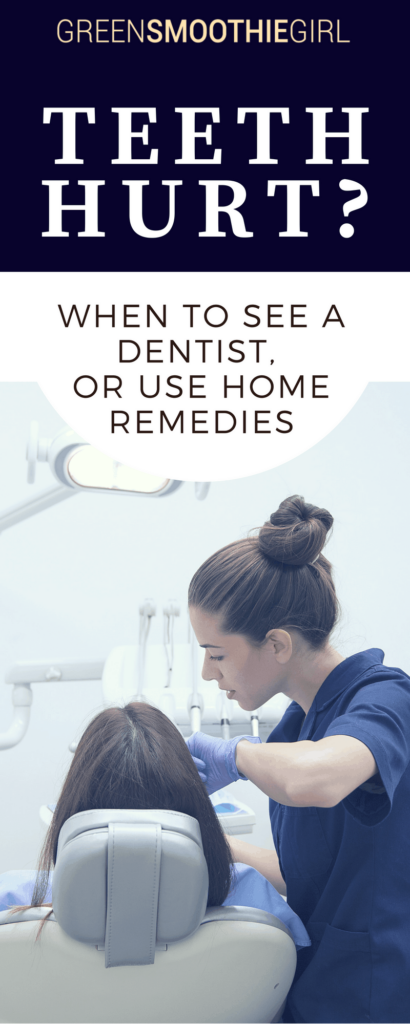Teeth Hurt? When To See A Dentist, Or Use Home Remedies

When your teeth hurt it can be alarming, and sometimes it can be hard to know if you should treat the mouth pain at home or make an appointment with your biological dentist.
While many causes of dental pain can helped or healed with a holistic approach, some things require professional help, including dental emergencies. Untreated dental issues can lead to more serious illnesses like pneumonia or cardiovascular disease¹ and have a real impact on your quality of life². Knowing the difference between dental pain that requires a dentist’s care and mouth pain you can treat at home is key.
In this article:
- Causes of Dental Pain You Can Treat at Home
- When to See a Dentist for Mouth Pain
- Are Mouth Injuries Dental Emergencies?
Causes of Dental Pain You Can Treat at Home
There’s no need to rush to the dentist at the first sign that your teeth hurt. As it turns out, teeth aren’t static objects, and they can sometimes heal with a bit of TLC. Here are a few types of mouth pain that you can remedy at home.
- Bleeding Gums: This common problem is treatable at home in many cases. It's something you'll want to get a handle on quickly, though, since it can lead to more serious gum disease problems. You can generally stop bleeding gums with some easy changes and home remedies.
- Loss of Tooth Enamel: Tooth enamel is regenerative, and when you start to notice the signs of enamel loss, you can take action at home to remineralize your teeth.
- Dry Mouth: Xerostomia, or dry mouth, has a range of causes³ including medications and aging. The treatment is almost always the same, though: hydration, humidifiers, specialized mouthwashes, and xylitol gum.
[Related: What Causes Dry Mouth? Know the Symptoms and the Solutions]

If your teeth hurt due to a cavity that is contained in the enamel, it’s possible to reverse the damage at home.
- Cavities: If your teeth hurt due to a cavity that is contained in the enamel and hasn't gotten through to the dentin, it’s possible to reverse the damage at home. This post will explain the science as well as offer some options for relief.
- Occasional Sensitivity: It’s not uncommon for teeth to be sensitive to hot or cold from time to time, and a remineralization product can be helpful. Remineralizers include horsetail, cell salts, fat soluble vitamins, and bentonite clay.
- Receding Gums: If the recession is minor, you may be able to treat it at home using a bentonite clay pack and mild essential oils. However, receding gums have many causes and you may want to see a dentist to find out what’s causing yours.
When to See a Dentist for Mouth Pain
Still not sure if you should stay the course with your home remedies or make an appointment with your biological dentist? Here are some signs that you need professional intervention.
- You have persistent, acute, or severe pain. This could be a sign of an infection of the pulp of the tooth or an abscess, which can be serious. If you have pain that makes it hard to sleep, eat, or go about your day, or pain that lasts for more than a few days, make an appointment with your biological dentist.
- You see pus. Pus means infection. Whether it’s coming from your tooth or your gums, it’s time to turn to the pros before this escalates or turns systemic.
- You have mouth pain and swelling in your face, chin, or neck. Swelling in these areas can indicate a possible dental emergency or invasive infection. See a provider immediately.
- You have lingering sensitivity. If tooth sensitivity doesn’t go away for some time, wakes you up at night, or hurts on its own, it’s time to see a dentist.
- Your jaw hurts. Jaw pain and hurting teeth may be caused by temporomandibular joint dysfunction, or TMJ. TMJ can be managed in many cases, but doing so usually requires the help of a good dentist.
- You have advanced gum recession. Gum recession can be serious when it is advanced. Your dentist will need to assess the cause of the problem and determine how best to treat it.
- You have a fever. If your tooth pain comes along with a hot friend (and not the kind you want to set up with your sister), play it safe and get to your dentist’s office.
Are Mouth Injuries Dental Emergencies?
Maybe you’re roughhousing with your kids or sliding into home during your baseball team’s big game, things don’t go as smoothly as planned, and you end up with an injury to your mouth. Is this a dental emergency? Should you see a dentist or treat it at home? The answer is: it depends.
When you have an accident, and your teeth hurt, you need to assess: is this a dental emergency? Should you see a dentist or treat it at home? The answer is: it depends.
Mouth injuries that are not emergencies:
- Small cuts to the gums
- Injured but mostly intact lips
- A minor chip in the tooth (you’ll need it treated, but it’s not an emergency.)
- A slightly loosened tooth (again, it may require treatment, but is not an emergency)
Mouth injuries that are emergencies:
- Large cuts to the gums or lips
- A significantly chipped or broken tooth
- A knocked-out tooth
- A tooth that is pushed forward or back
Next time dental pain hits, refer to this list to determine if you can treat it at home or if you should head on over to your dentist’s office.
Need to find a good biological dentist? We've done all the legwork for you. Check out our free Holistic Dentist Finder.
Up Next: Periodontitis vs Gingivitis: Know the Differences & Warning Signs

Disclosure: This post may contain affiliate links that help support the GSG mission without costing you extra. I recommend only companies and products that I use myself.
Sources
1. Xiaojing Li, Kristin M. Kolltveit, Leif Tronstad, and Ingar Olsen; (2000) Systemic Diseases Caused by Oral Infection, Clin Microbiol Rev
2. Susan O. Griffin, PhD, Judith A. Jones, DDS, MPH, DScD, Diane Brunson, RDH, MPH, Paul M. Griffin, PhD, and William D. Bailey, DDS, MPH; (2012); Burden of Oral Disease Among Older Adults and Implications for Public Health Priorities, Am J Public Health
3. Alessandro Villa, Christopher L Connell, and Silvio Abati; (2015) Diagnosis and Management of Xerostomia and Hyposalivation, Ther Clin Risk Manag
Disclaimer: This article may contain affiliate links, which allow you to support our mission without costing you extra.
Posted in: Dental Health, Health Concerns, Holistic Care, Natural Remedies


















No comments found, but you can be our first!